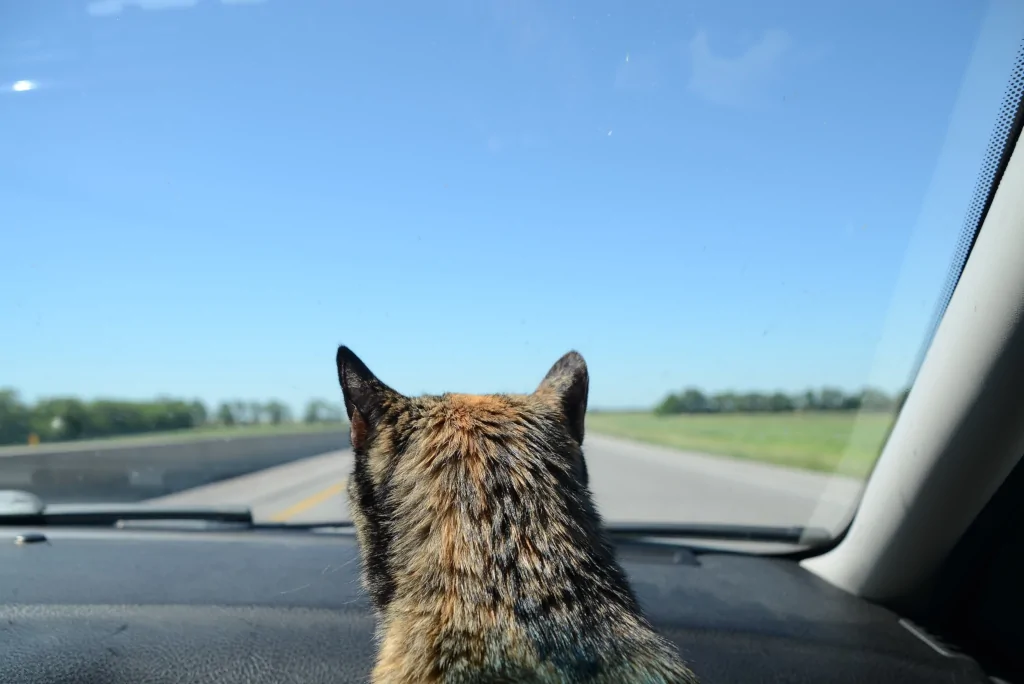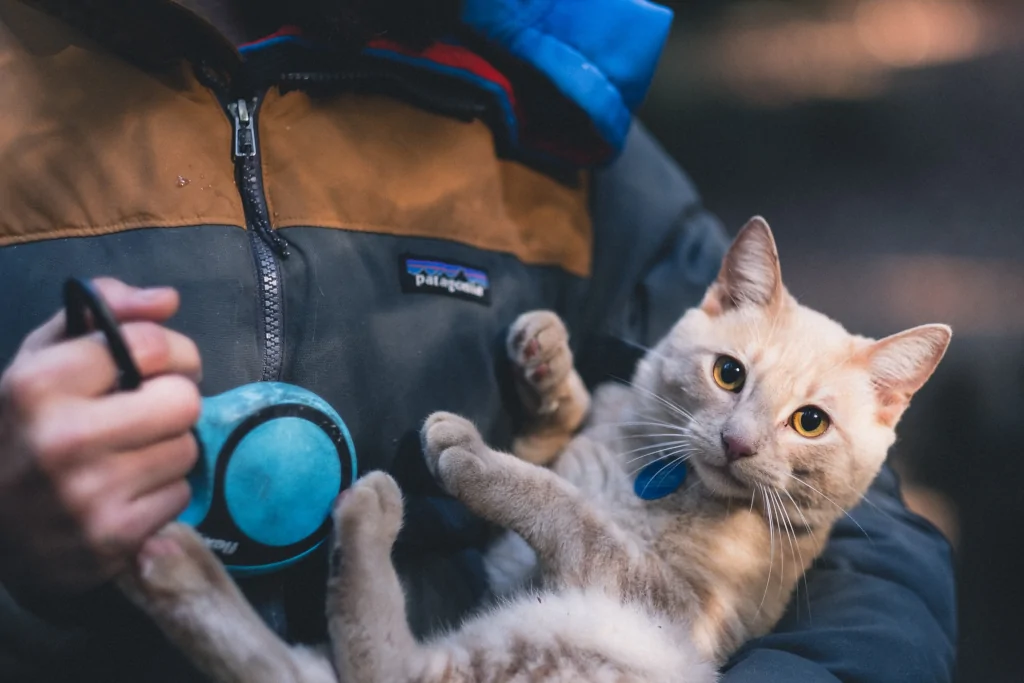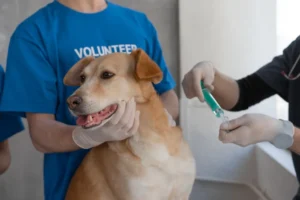Embarking on an adventure with your whiskered pal? Ensuring their health and safety should be at the top of your to-do list!
This handy guide covers everything you need to know about vaccinations, health certificates, and stress-free travel tips for your cat. Read on to discover how to make your feline friend’s journey as smooth as their sleek coat!
Highlights:
- You may need to comply with legal requirements of some states/countries
- Core vaccines for domestic travel: FPV, FVRCP, and rabies.
- International travel may require a pet passport and additional vaccines like FVRCP, rabies, and other requirements.
- Timing is crucial. Plan at least 2-3 months before travel for vaccinations.
- Gradually acclimate your cat to the carrier and pack a travel kit.

Why Do Traveling Cats Need Vaccines?
Vaccines play a crucial role in keeping your cat healthy during travel. There are a few reasons why it’s important to have your cat vaccinated before hitting the road:
- Protection from diseases. Travel exposes your cat to new environments, and along with them, the risk of encountering viruses and bacteria. Vaccines help shield your cat from harmful diseases and prevent them from getting sick.
- Legal requirements. Depending on your destination, there might be specific vaccination requirements for cats entering the region. Staying up-to-date with vaccinations ensures a hassle-free experience at border crossings or checkpoints.
- Safe for others. By having your cat vaccinated, you’re not only protecting them, but also safeguarding the health of other pets and even humans they may come into contact with.
Remember, a well-vaccinated cat is a happy traveler. In the following sections, we’ll discuss which vaccines are necessary for domestic and international journeys, and how to ensure your feline is ready for the trip.
Which Vaccines for Domestic Travel?
When traveling with your cat within the country, it’s important to know which vaccines are essential. While requirements may vary slightly depending on the destination, some core vaccinations are typically recommended for domestic travel:
- Feline Panleukopenia (FPV). Also known as feline distemper, this highly contagious viral disease can be life-threatening for cats. The FPV vaccine is a crucial component of your cat’s vaccination schedule.
- Feline Calicivirus (FCV) and Feline Herpesvirus-1 (FHV-1). These two viruses are responsible for the majority of upper respiratory infections in cats. A combination vaccine, often called the FVRCP vaccine, protects against both of these illnesses along with FPV.
- Rabies. Although not all states or regions require cats to be vaccinated against rabies for domestic travel, it’s still a wise choice. Rabies is a fatal disease that can affect both animals and humans, so vaccination is key to ensuring safety.
Before embarking on your journey, consult with your veterinarian to determine the specific vaccinations needed based on your travel plans and your cat’s health history. If your cat is an outdoor one, check this guide first.
Seasonal outbreaks can impact vaccination needs. If traveling during flu season, ask your vet about the feline influenza vaccine.
They’ll be able to guide you through the process and recommend any additional vaccinations that might be beneficial.
Going International? Pet Passport Vaccines
When planning an international trip with your cat, it’s essential to be aware of the specific vaccine requirements for your destination country.
Many countries require a “pet passport” – a set of documents that verifies your cat’s vaccination history and overall health. Here are some common vaccine requirements for international pet travel:
- Rabies. This is often the primary vaccine required for international travel. Some countries may also mandate a rabies blood test to ensure that your cat has an adequate level of immunity.
- FVRCP. The combination vaccine for Feline Panleukopenia, Calicivirus, and Herpesvirus-1 is also frequently required for entry into foreign countries, providing broad protection against common feline diseases.
- Country-specific requirements. In addition to the core vaccines mentioned above, some countries may have unique vaccination mandates to protect against region-specific diseases. For instance, the Feline Leukemia (FeLV) vaccine might be required in certain countries.
To prepare for international travel, research the vaccine requirements of your destination country well in advance. Once again, be sure to consult your veterinarian for guidance on the appropriate vaccines and the timing of their administration.
Keep in mind, some airlines have their own health requirements, separate from country regulations. Always double-check with your chosen carrier about their specific vaccine prerequisites.
By working closely with your vet, you can ensure your cat’s pet passport is in order, and your journey abroad goes smoothly.

The Right Timing for Your Cat’s Vaccines
Most vaccines need to be administered several weeks before departure to ensure optimal protection.
Some countries require specific waiting periods after vaccination before your cat can enter. For example, the rabies vaccine often requires a waiting period of 21 to 30 days after administration.
So, start early. Begin researching and scheduling vaccinations at least 2 to 3 months before your planned departure date. This will allow enough time for booster shots, waiting periods, and any additional vet visits. Some cats might experience mild side effects post-vaccination. Allow a buffer for them to recover before setting out.
It’s essential that you consult your vet about your traveling plans. Share your travel itinerary with your veterinarian, including destinations, layovers, and planned activities. They will help you create a customized vaccination schedule for your cat based on these factors.
Finally, keep records. Maintain an up-to-date record of your cat’s vaccinations. This information will be essential for obtaining health certificates and pet passports.
Titer Testing: Is Your Cat Ready to Travel?
Titer testing is a valuable tool that measures your cat’s immunity levels for certain diseases, helping you determine if their vaccinations are still effective.
This can be particularly useful for cats with unknown vaccination histories, senior cats, or cats that may have had adverse reactions to vaccines in the past.
Some countries accept titer test results as proof of immunity in lieu of certain vaccinations. When possible, opt for titer tests before re-vaccinating, especially if your cat has been regularly vaccinated in the past. This avoids unnecessary vaccine stress on your cat’s system.
Remember to schedule titer testing in advance of your trip, as processing the results can take several weeks. Additionally, some countries require titer tests to be performed within a specific time frame before entry.
If you’re considering titer testing for your cat, consult your veterinarian to discuss its suitability and potential benefits. They will guide you through the process and help you make informed decisions regarding your cat’s health and readiness for travel.
Health Certificates: What Else Is Required?
In addition to vaccinations, obtaining a health certificate for your cat is a vital step in preparing for travel.
A health certificate, often called a Certificate of Veterinary Inspection (CVI), is a document issued by a licensed veterinarian that confirms your cat is in good health and meets the necessary requirements for travel.
To make this process smooth and stress-free, try to follow a few guidelines.
First, time your vet appointment: Schedule a visit with your veterinarian based on your travel type. Domestic travel typically requires a visit within 10 days of departure, while international guidelines vary.
Second, be sure to discuss destination-specific requirements. Some countries may require additional treatments like deworming or microchipping. Talk to your vet about any extra steps needed for your specific travel plans.
Finally, obtain official paperwork. Your vet will complete the health certificate forms, which might need endorsement from a governing body like the USDA. Be aware of potential processing times.
Try to focus on these key points and be well-prepared, so you can make the health certification process a breeze.
Keep digital backups of health records and certificates. Paper gets lost, but cloud storage can be a lifesaver. This will allow you and your cat to embark on your adventure with confidence.
Tips for Stress-Free Travels With Your Cat
Embarking on a journey with your cat can be an exciting experience, but it’s important to keep their comfort and well-being in mind. Here are some practical tips to ensure a relaxed trip for both you and your feline companion:
- Invest in a suitable carrier. Choose a carrier that is well-ventilated, secure, and appropriately sized for your cat. It should be large enough for them to stand up, turn around, and lie down comfortably.
- Gradually acclimate your cat to the carrier. Introduce your cat to the carrier well before your trip, allowing them to explore and become familiar with it. Encourage positive associations by placing treats or toys inside.
- Schedule a test drive. Before hitting the road for an extended trip, take your cat on short car rides to gauge their comfort level and make any necessary adjustments.
- Pack a travel kit. Bring along essentials like food, water, bowls, a litter box, litter, a scoop, waste bags, medications, and a favorite toy or blanket to help your cat feel secure.
- Keep your cat’s routine consistent. As much as possible, maintain their regular feeding, play, and sleep times during travel. This familiarity can help reduce stress.
- Plan for breaks. Schedule regular stops during road trips to allow your cat to stretch, hydrate, and use the litter box.
By following these guidelines, you can create a more enjoyable and stress-free travel experience for both you and your beloved feline friend.
FAQs
Can my cat travel without vaccinations?
In most cases, cats require vaccinations for travel, especially for international trips or boarding facilities.
How long before travel should I visit the vet?
Plan to visit your vet at least 4-6 weeks before traveling to allow time for vaccinations and other requirements. If you’ve never been at the vet, check out this guide.
Do indoor cats need vaccines for travel?
Yes, even indoor cats require vaccinations for travel, as they may be exposed to new environments and potential risks.
Are there travel restrictions for unvaccinated cats?
Travel restrictions vary by destination. However, most countries and airlines require cats to be vaccinated before travel. If you don’t comply with these requirements, your cat may be quarantined or denied entry.
Alex, a passionate animal lover, has experience in training and understanding animal behavior. As a proud pet parent to two dogs and three cats, he founded AnimalReport.net to share insights from animal experts and expand his knowledge of the animal kingdom.









